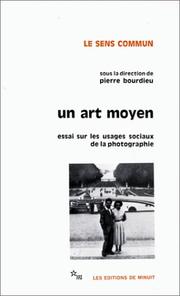| Listing 1 - 3 of 3 |
Sort by
|
Book
ISBN: 9781912064755 1912064758 Year: 2019 Publisher: London Lawrence & Wishart
Abstract | Keywords | Export | Availability | Bookmark
 Loading...
Loading...Choose an application
- Reference Manager
- EndNote
- RefWorks (Direct export to RefWorks)
This book examines how Western photographic practice has been used as a tool for creating Eurocentric and violent visual regimes, and demands that we recognise and disrupt the ingrained racist ideologies that have tainted photography since its inception in 1839. Decolonising the Camera trains Mark Sealy's sharp critical eye on the racial politics at work within photography, in the context of heated discussions around race and representation, the legacies of colonialism, and the importance of decolonising the university. Sealy analyses a series of images within and against the violent political reality of Western imperialism, and aims to extract new meanings and develop new ways of seeing that bring the Other into focus. The book demonstrates that if we do not recognise the historical and political conjunctures of racial politics at work within photography, and their effects on those that have been culturally erased, made invisible or less than human by such images, then we remain hemmed within established orthodoxies of colonial thought concerning the racialised body, the subaltern and the politics of human recognition. With detailed analyses of photographs - included in an insert - by Alice Seeley Harris, Joy Gregory, Rotimi Fani-Kayode and others, and spanning more than 100 years of photographic history, Decolonising the Camera contains vital visual and written material for readers interested in photography, race, human rights and the effects of colonial violence.
Photography --- Social aspects. --- Philosophy. --- Social aspects --- Philosophy --- Sociology of minorities --- fotografie --- fotografiegeschiedenis --- fotografietheorie --- twintigste eeuw --- fotografie en politiek --- fotografie en kolonialisme --- fotografie en racisme --- Congo --- Verenigde Staten --- Groot-Brittannië --- 77.01 --- Racism --- Colonization --- Photographs. --- photography [process] --- racial discrimination --- Photography - Social aspects --- Photography - Philosophy --- Histoire de la photographie --- Colonialisme --- Noirs --- Discrimination raciale --- Art --- Photographie --- Aspects sociaux --- Philosophie --- Race --- Racisme --- dekolonisatie --- Imperialism in art. --- Imperialism --- Photography. --- Racism in art. --- History --- Aspect social. --- Philosophie. --- Political aspects --- History.

ISBN: 2707300292 9782707300294 Year: 1965 Publisher: Paris Ed. de Minuit
Abstract | Keywords | Export | Availability | Bookmark
 Loading...
Loading...Choose an application
- Reference Manager
- EndNote
- RefWorks (Direct export to RefWorks)
Photography, Artistic --- Photographie artistique --- #VCV monografie 1999 --- 77.01 --- 77.01 Fotografie--Semiotiek van de fotografie. Theorie --- Fotografie--Semiotiek van de fotografie. Theorie --- #SBIB:309H525 --- #SBIB:309H122 --- Sociologie van de audiovisuele boodschap --- Fotogrammen: functies, genres, historiek --- Photography --- Sociology of culture --- Photographie --- --Sociologie --- --Sémiologie --- --Représentant de commerce --- --Photography --- Philosophy --- Social aspects --- CDL --- Artistic photography --- Photography, Pictorial --- Pictorial photography --- Art --- Aesthetics --- fotografie --- fotografietheorie --- sociologie --- fotografie en sociologie --- filosofie --- Photography - Philosophy --- Sociologie --- Sémiologie --- Représentant de commerce --- Photography - Social aspects --- Art et societe --- Art populaire. --- Culture populaire. --- Photographie artistique. --- Folk art. --- Popular culture. --- Photography, Artistic. --- Psychologie. --- Société. --- Arts plastiques --- Société
Book
ISBN: 9462702659 9789462702653 Year: 2021 Volume: 30 Publisher: Leuven Leuven University Press
Abstract | Keywords | Export | Availability | Bookmark
 Loading...
Loading...Choose an application
- Reference Manager
- EndNote
- RefWorks (Direct export to RefWorks)
Imagine a world in which each individual has a fundamental right to be reborn. This idle dream haunts Hilde Van Gelder's associative travelogue that takes Allan Sekula's sequence Deep Six / Passer au bleu (1996/1998) as a touchstone for a dialogue with more recent artworks zooming in on the borderscape near the Channel Tunnel, such as those by Sylvain George and Bruno Serralongue. Combining ethnography, visual materials, political philosophy, cultural geography, and critical analysis, Ground Sea proceeds through an innovative methodological approach. Inspired by the meandering writings of W.G. Sebald, Javier Marías, and Roland Barthes, Van Gelder develops a style both interdisciplinary and personal. Resolutely opting for an aquatic perspective, Ground Sea offers a powerful meditation on the indifference of an increasingly divided European Union with regard to considerable numbers of persons on the move, who find themselves stranded close to Calais. The contested Strait of Dover becomes a microcosm where our present global challenges of migration, climate change, human rights, and neoliberal surveillance technology converge.
77 --- 77 Fotografie --- Fotografie --- fotografie --- neoliberalisme --- 77.071 VAN GELDER --- fotografie en ecologie --- fotografie en politiek --- ecologie --- Sekula Allan --- Noordzee --- Europa --- cultuurfilosofie --- postkolonialisme --- migratie --- documentaire fotografie --- 77.044 --- fotografietheorie --- 77.01 --- Human rights --- Photography --- Political aspects --- Social aspects --- Europe --- Dover, Strait of --- Calais, Strait of --- Dover Strait --- Fretum Gallicum --- Pas de Calais --- Strait of Calais --- Strait of Dover --- Straits of Dover --- Emigration and immigration --- Academic collection --- Migration. Refugees --- documentary photography --- The Channel --- Mensenrechten --- Politieke aspecten --- Sociale aspecten --- Sekula, Allan --- Government policy --- Human rights - Europe --- Photography - Political aspects --- Photography - Social aspects --- Europe - Emigration and immigration --- Dover, Strait of - Pictorial works
| Listing 1 - 3 of 3 |
Sort by
|

 Search
Search Feedback
Feedback About UniCat
About UniCat  Help
Help News
News